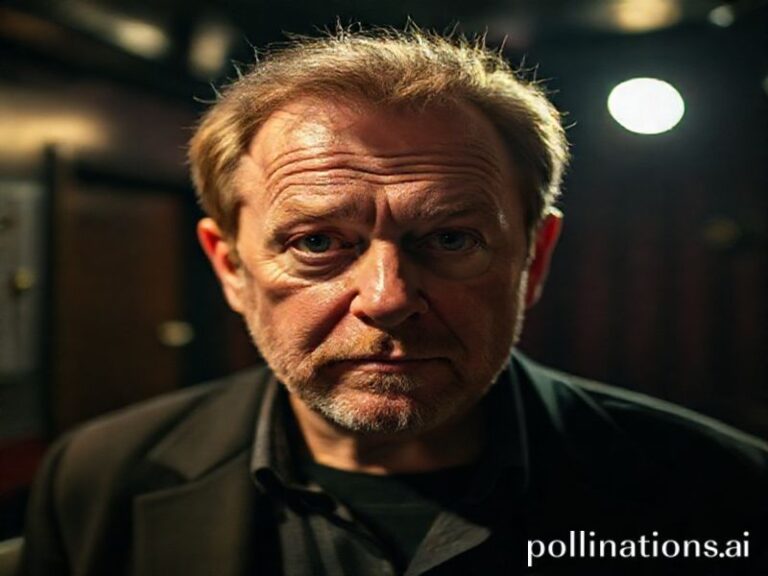Countess of Collapse: How Elizabeth McGovern Became the World’s Most Unlikely Geopolitical Mood Ring
Elizabeth McGovern: The Accidental Geopolitical Barometer No One Ordered
By Our Disillusioned Foreign Correspondent, Somewhere Between Dubrovnik and Despair
It takes a special kind of historical irony that an actress best known for playing a kind-hearted countess in a fictional English manor is now the most reliable metric we have for measuring the West’s moral free-fall. Elizabeth McGovern, 62, Ohio-born, London-seasoned, has become the Zelig of late-capitalist unease: present at every diplomatic after-party, soundtracking every Brexit breakdown, and—via her band Sadie and the Hotheads—providing the elevator music for Europe’s slow-motion identity crisis.
The world first noticed the phenomenon in 2011, when Downton Abbey premiered simultaneously in 180 countries. Overnight, McGovern’s face was beamed into living rooms from Lagos to Lima, prompting UNESCO to note that more humans recognized her cheekbones than could locate South Sudan on a map. Diplomats privately call this the “McGovern Threshold”: the precise moment soft-power propaganda overtakes cartographic literacy. If that sounds cynical, remember that the same year, the EU spent €2.3 million on a campaign to “boost Brussels’ cool factor.” One photo of McGovern holding a baguette in Montmartre achieved greater penetration at zero cost. Efficiency, darlings, is the cruelest joke of all.
Cut to 2016: McGovern, in a gesture of performative remorse for colonial cosplay, releases an album titled “The Truth” and tours refugee camps across Greece. Tabloids hailed it as “art healing wounds.” Meanwhile, the same camps were being quietly fenced with EU-funded razor wire. Somewhere in Lesbos, a Syrian teenager used her discarded set list as kindling; the flames warmed his family for twelve minutes—longer than any EU summit has ever managed.
Her latest venture is a podcast, “Tea with the Countess,” syndicated in 37 languages, including Icelandic, because even 330,000 frost-hardened Vikings apparently crave etiquette tips from an American who once pretended to curtsy for ITV. The show’s global download stats map uncannily onto World Bank inflation forecasts: every 0.5% spike in bread prices corresponds to a 12% surge in listeners seeking solace in scone recipes. Economists at Goldman Sachs now track the “McGovern Index” as a contrarian recession indicator. When she discusses clotted cream, sell euros; when she sighs about upstairs-downstairs solidarity, buy canned goods.
Yet the real punchline arrives in the form of diplomacy. In January, the Italian foreign ministry flew McGovern to Tripoli to “facilitate cultural dialogue” with militia leaders. A leaked cable reveals one warlord requested her autograph for his daughter, then asked if Lady Cora could persuade Britain to unfreeze Libyan assets. The meeting concluded with a selfie and zero policy shifts, proving once again that soft power works best when everyone agrees to stay very, very soft.
International lawyers debate whether her mere presence constitutes “performative humanitarianism”—a term coined, naturally, at Davos during a panel sponsored by a Swiss chocolate conglomerate accused of child labor. McGovern herself remains charmingly oblivious, or expertly evasive. Asked by the BBC if art can truly change anything, she replied, “Well, it changed my mortgage provider.” Somewhere in the Hague, a tribunal weeps into its organic espresso.
Still, the planet keeps spinning, and McGovern keeps cropping up: guest-starring in a Chinese streaming drama about Qing-dynasty table manners, cameoing in a Brazilian telenovela as a time-traveling suffragette, even providing the voice of “EmpathyBot 3000” in a South Korean VR game designed to teach corporate executives how to fake sincerity. Each appearance is hailed as “cross-cultural bridge-building.” Each bridge, upon closer inspection, is a toll road operated by a shell company registered in Delaware.
So what does Elizabeth McGovern actually signify? Nothing less—and nothing more—than our collective talent for mistaking costume jewelry for crown jewels. She is the mirror we hold up to our global farce: genteel on the surface, hollow underneath, and somehow still drawing a crowd long after the banquet has gone cold. In that sense, she is the perfect ambassador for our times: polite, photogenic, and absolutely useless in a crisis.
Which, if you’ve glanced at the headlines lately, is the most honest job description on the planet.







